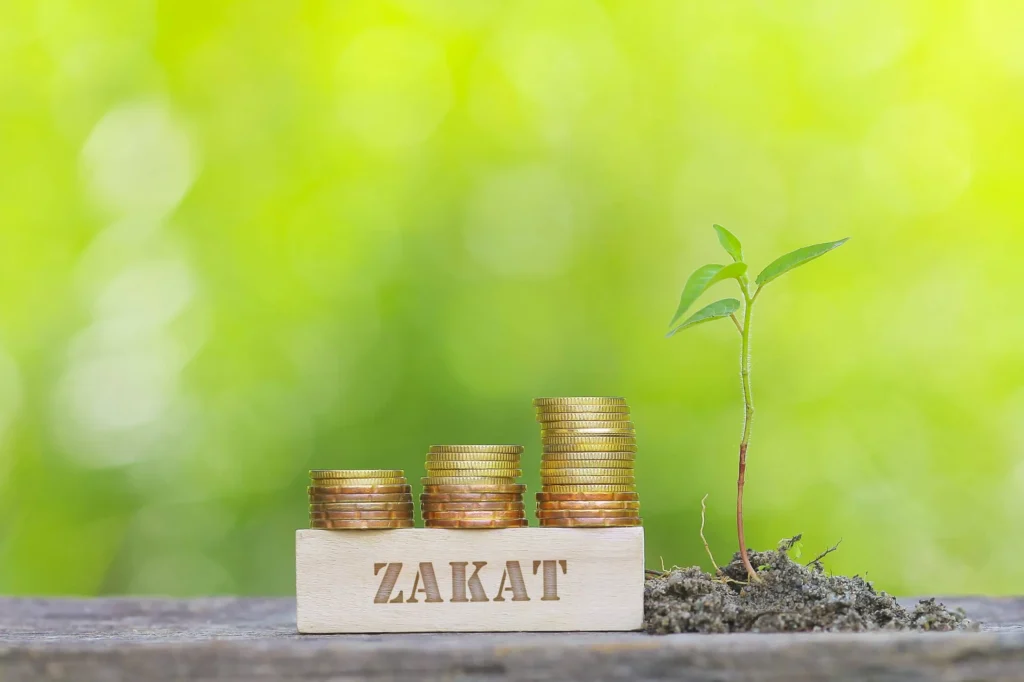What is Zakat? Understanding One of the Pillars of Islam
Estimated reading time: 15 minutes
Key Points
- Zakat is a mandatory religious financial obligation in Islam, aimed at purifying wealth and promoting social justice.
- Zakat is considered one of the Five Pillars of Islam, demonstrating the spirit of sharing and community cohesion.
- There are two main types of Zakat: Zakat Al-Fitr (obligatory at the end of Ramadan) and Zakat Al-Mal (on accumulated wealth).
- The process of paying Zakat includes determining the nisab (minimum wealth threshold), calculating, and distributing it to the recipients specified in the Qur’an.
- Overview of What Zakat Is
- Definition and Meaning of Zakat
- Origin and Historical Development of Zakat
- What is Zakat: Detailed Concepts, Components, and Conditions for Paying Zakat
- Classification of Zakat Types
- How to Calculate Zakat: Principles, Process, and Practical Examples
- The Process of Paying Zakat and Its Beneficiaries
- The Role and Impact of Zakat in Society
- Some Frequently Asked Questions about What Zakat Is
- Conclusion and Future Direction of Zakat
1. Overview of What Zakat Is
Hello, I am Nuhaira. With a passion for exploring the cultural depth and human values hidden behind every custom, I always seek to share my understanding of the Islamic world and Vietnam. Today, we will together explore one of the most important pillars of Islam, a concept with a profound impact on personal and social life: What is Zakat?
If you have ever been curious about the philosophy, ethics, or social system of Islam, understanding Zakat is the key. It is not just a financial obligation but also an indispensable part of the overall picture of Islam, likened to one of the Five Pillars of this religion. Zakat strongly embodies the principle of sharing and community cohesion, a value that every culture holds in high regard.
2. Definition and Meaning of Zakat
To better understand the meaning of Zakat, we first need to grasp its definition. Zakat is a mandatory religious financial obligation, completely different from voluntary charity (Sadaqah). According to Islamic standards (Shariah), Zakat is a form of obligatory almsgiving, serving as both a religious law and an act of worship to Allah, aimed at purifying wealth and strengthening social justice. The Zakat rate is typically 2.5% of the value of accumulated assets, including cash, gold, silver, and business goods, with certain conditions regarding the threshold and duration of ownership.
The meaning of Zakat in Islam is extremely profound, impacting both individuals and the community:
- For the individual: Zakat helps the payer purify their wealth, eliminate greed and selfishness, and ensures that their assets become lawful and pure in the eyes of Allah. It cultivates the qualities of altruism and obedience to God.
- For society: Zakat plays a key role in redistributing wealth, reducing the gap between the rich and poor, and supporting those in need. Through Zakat, the community becomes more cohesive, creating a strong social safety net where the vulnerable are cared for and supported.
3. Origin and Historical Development of Zakat
To explain why Zakat holds such an important position, we need to understand the origin of Zakat and its developmental journey. Zakat is clearly stipulated in passages of the Qur’an and Hadith (the teachings and actions of Prophet Muhammad). It is the third pillar of Islam, a doctrine that appeared and was practiced from the time of Prophet Muhammad.
Historically, the implementation of Zakat has gone through many stages. Initially, it was a mandatory obligation centrally managed by the Islamic state. Even disputes or non-payment of Zakat led to major conflicts, notably the Ridda wars (apostasy wars) after the death of Prophet Muhammad. This demonstrates the absolute importance of Zakat in maintaining order and unity in the early Islamic community. Over time, in many Muslim countries, the regulations regarding Zakat have changed. Although the core spirit remains, the forms of collection and management can differ: some countries still maintain compulsory Zakat collection organized by the state (like Saudi Arabia, Malaysia), while many others have shifted to encouraging voluntary or semi-voluntary contributions.

4. What is Zakat: Detailed Concepts, Components, and Conditions for Paying Zakat
To properly fulfill the obligation of Zakat, we need to clearly understand the concepts and conditions for paying Zakat.
- Who must pay Zakat?
Zakat is an obligation for every adult, free Muslim who is financially capable and owns assets reaching a minimum threshold called *nisab*. More importantly, these assets must be maintained continuously for at least one lunar year (the term *hawl*). This ensures that only those who are truly financially stable are required to fulfill this duty, without burdening those facing difficulties.
- Assets subject to Zakat:
The common types of assets subject to Zakat include:
- Cash, bank deposits, investments
- Gold and silver (jewelry, bars)
- Business goods (inventory, products for sale)
- Livestock (cattle, poultry)
- Agricultural produce (crops, harvest)
- Minerals and other natural resources
- Conditions and Rate of Zakat:
The most common Zakat rate is 2.5% of the total value of accumulated assets that have reached the nisab and been held for a full hawl. For agricultural produce, the rate can range from 5% to 10% depending on the irrigation method (natural or artificial). Zakat is usually performed once a year, at the time the assets meet the conditions.
5. Classification of Zakat Types
Zakat is not of a single type but is divided into different forms, each with its own purpose and time of implementation. Understanding these types of Zakat will help you gain a deeper insight into the comprehensive nature of this system in Islam.
Basically, there are two main types of Zakat that every Muslim should know:
- Zakat Al-Fitr: This is a special Zakat, obligatory for every Muslim (including newborn infants) at the end of the fasting month of Ramadan. The main purpose of Zakat Al-Fitr is to purify any shortcomings or imperfections in an individual’s fast, while also ensuring that everyone, including the poorest, has enough food to celebrate Eid al-Fitr. This Zakat is usually paid in the value of a certain amount of basic foodstuff.
- Zakat Al-Mal: This is the type of Zakat collected on an individual’s accumulated wealth, as its name suggests (“Mal” means wealth). Zakat Al-Mal applies to gold, silver, currency, business goods, livestock, and other forms of assets that have reached the nisab threshold and have been held for one lunar year (hawl). The prescribed rate for Zakat Al-Mal is mostly 2.5% .

In addition to these two main types, there are other subsidiary types of Zakat that apply to more specific sources of wealth, such as Zakat on agricultural produce, minerals, or marine products. Each type has its own regulations regarding the threshold and payment rate, reflecting the detail in Islamic law to ensure fairness and efficiency in the distribution of wealth to society.
6. How to Calculate Zakat: Principles, Process, and Practical Examples
Once you are clear about the types of Zakat, the next step is to understand how to calculate Zakat to fulfill your obligation accurately.
General principles for calculating Zakat:
- Determine the Nisab: First, you need to determine if the total value of your assets meets the *nisab* threshold. *Nisab* is the minimum amount of wealth a person must own to be liable for Zakat. This threshold is often equivalent to the value of 87.48 grams of gold or 612.36 grams of pure silver. The value of *nisab* can fluctuate depending on the market price of gold/silver.
- Completion of Hawl: The assets must be owned continuously for at least one lunar year (the term *hawl*).
- Deduct debts: Reasonable and necessary debts can be deducted from the total assets subject to Zakat.
Basic formula for accumulated assets:
For cash, gold, silver, and business goods, the formula for calculating Zakat is very simple:
$$ \text{Zakat} = \text{Total Value of Zakatable Assets} \times 2.5\% $$
Practical example:
Suppose you have 100 million VND in savings that has been maintained continuously in a bank account for a full lunar year, and this amount is above the current *nisab* threshold. The amount of Zakat you need to pay would be:
$$ 100,000,000 \text{ VND} \times 2.5\% = 2,500,000 \text{ VND} $$
Similarly, if you own an amount of gold that reaches the *nisab* and has been held for a full *hawl*, you would also calculate 2.5% of the total value of that gold
For agricultural produce, the Zakat rate is different:
- If the crops are irrigated naturally (by rain, rivers, streams), the Zakat rate is 10%.
- If the crops require artificial irrigation (such as irrigation systems, pumps), the Zakat rate is 5%
Zakat for agricultural produce is usually paid at the time of harvest.
Calculating Zakat requires care to ensure you are fulfilling your religious duty correctly.
7. The Process of Paying Zakat and Its Beneficiaries
After calculating the amount of Zakat to be paid, the next step is to follow the process of paying Zakat and ensure this money reaches the rightful beneficiaries of Zakat.
Methods of paying Zakat:
- Direct delivery: Traditionally, Zakat can be given directly to those who need it.
- Through Zakat organizations/funds: In modern times, many people choose to pay Zakat through Islamic charitable organizations, Zakat funds, or specialized government agencies (for countries with legal regulations on mandatory Zakat collection). This helps ensure that Zakat is distributed more systematically and effectively.
Recipients of Zakat:
The Qur’an has clearly specified 8 categories of people entitled to receive Zakat. The distribution of Zakat is limited to these groups to ensure transparency and adherence to the spirit of religious law. These 8 groups include:
- The poor (Al-Fuqara’): Those who have no assets or too few to meet their basic needs.
- The needy (Al-Masakin): Those who have fewer assets than the poor, possessing almost nothing.
- Zakat collectors (Al-Amilin alayha): Those appointed to collect and distribute Zakat.
- New converts (Al-Mu’allafatu Qulubuhum): Those who have recently converted to Islam and need support to strengthen their faith.
- To free slaves (Ar-Riqab): Used to purchase and free slaves.
- Those in debt (Al-Gharimin): Those who have legitimate debts and are unable to repay them.
- In the cause of Allah (Fi Sabilillah): Used for purposes of striving for Allah (e.g., defending the faith, propagating Islam, or supporting projects that serve the Muslim community).
- The wayfarer (Ibnus-Sabil): Travelers who are on a journey and have run out of money, unable to support themselves

The Qur’an
Distributing Zakat transparently and fairly is extremely important. It not only ensures adherence to the spirit of religious law but also helps strengthen community cohesion, prevent misuse, and optimize the effectiveness of this fund in supporting those who truly need help
8. The Role and Impact of Zakat in Society
Zakat is not only a personal obligation but also a powerful socio-economic mechanism that plays a key role in building and developing the Muslim community. The role of Zakat and its impact on society are immense.
- Zakat helps alleviate poverty:
One of the most direct and clear impacts of Zakat is its ability to reduce inequality and support the vulnerable. By circulating wealth from the rich to the poor, Zakat creates an automatic social safety net, helping the less fortunate to obtain resources to improve their lives, access education, healthcare, and other basic needs. This contributes to reducing the burden on the government and promoting a more just society.
- Community cohesion and development:
Zakat is a bridge between social classes, fostering compassion, sharing, and community responsibility. When the wealthy contribute Zakat, they not only fulfill a religious duty but also contribute to the overall prosperity of society. This strengthens solidarity and bonds among members.
In practice, many Muslim countries have built effective Zakat fund systems, becoming exemplary models of using religious resources for social development purposes. For example, in Malaysia and Saudi Arabia, government-sponsored Zakat agencies have implemented numerous poverty alleviation programs, supported education, and built community infrastructure using Zakat funds. These projects not only directly help those in need but also create sustainable development opportunities for the entire community.
9. Some Frequently Asked Questions about What Zakat Is
When learning about any new cultural aspect, many questions arise. Below is a compilation and answers to some frequently asked questions about what Zakat is that you might be wondering about:
- Who must pay Zakat?
Zakat is an obligation for every adult, free Muslim who has sufficient wealth (reaching the *nisab* threshold) and has maintained that wealth for one lunar year (*hawl*).
- When should Zakat be paid?
Zakat Al-Mal (Zakat on wealth) is usually paid once a year, when a full lunar year has passed since your wealth reached the *nisab*. Zakat Al-Fitr (Zakat at the end of Ramadan) is paid at the end of the month of Ramadan, before the Eid al-Fitr prayer.
- How is Zakat calculated?
For accumulated assets (money, gold, silver, business goods), Zakat is calculated at 2.5% of the total value of assets that have reached *nisab* and have been held for a full *hawl*. For agricultural produce, the rate is 5% or 10% depending on the irrigation method.
- How do Zakat and taxes differ?
This is a common question. Zakat is a religious obligation, stipulated by Islamic law (Shariah), focused on redistributing wealth to achieve social justice and purify assets. In contrast, taxes are a legal obligation of a citizen to the government, used to fund public services and state operations. Although both are forms of mandatory payment, their origins, purposes, and operational mechanisms are different.

